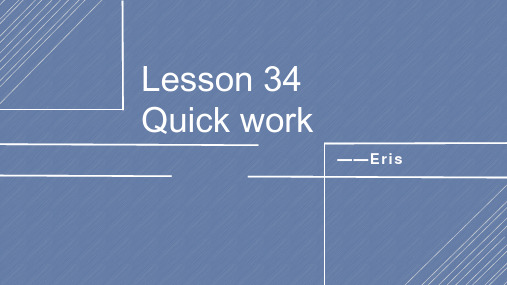新概念2-L34课件
合集下载
新概念2第34课PPT教学课件

2020/12/10
8
• It is now being sent to his home by train.
时态? 长江上正在修建另一座大桥。
Another bridge is being built over the Changjiang River.
我校正在举行运动会。
The sports meeting is being held in our school. 现在学生们正在打扫教室。
local police.
accept &receive? 他已经接受了我们的邀请。
He has accepted our invitation. 我没有收到你的传真。
I didn’t receive your fax.
accept: 强调主动地或自愿地接受,或者说,经过考虑后同意 接受。
receive: 着重仅仅接到或收到这一结论或事实,而不含采取主 动或积极行动的意思。
示通缉,追捕。
Not…any more: 我不能再见你了。
I can’t see you any more. 我不能再等了。
I can’t wait any more. 他不再是个年轻人了。
He is not a young man any more. Not…any more=no more Not …any longer=no longer
Dan wondered why he was wanted by the police, but he went to the station yesterday and now he is not worried anymore.
wonder= want to know wonder whether/if/who/when/where/what/why + 从句”
新概念英语第二册Lesson+34+课件+

station most /5steIF[n//m[Jst/
most
Look, listen and answer
Q1: Where did he go yesterday? Q2: What have the police found? Q3: When was his bicycle stolen?
are working day and night.
A. is building B. is being built C. will build D. be building
4.Nick had an unusually clever mind, so his success had been
B and never in doubt.
Fill in the blanks 2
Quick work Dan Robinson has been _w_o_rr_i_ed_ all week. Last Tuesday he r_e_c_e_iv_e_d a letter from the local police. In the letter he was _a_s_k_e_d_ to __c_a_ll__at the station. Dan _w_o_n_d_er_e_d_ why he was _w_a_n_te_d_ by the police, but he __w_e_n_t__ to the station yesterday and now he is not _w_o_rr_i_ed_anymore. At the station, he was __t_o_ld__ by a smiling policeman that his bicycle had been _f_o_u_n_d_. Five days ago, the policeman __to_l_d_ him, the bicycle was _p_i_ck_e_d_ up in a small village four hundred miles away. It is now being __se_n_t__ to his home by train. Dan was most surprised when he __h_ea_r_d_ the news. He was amused too, because he never _e_x_pe_c_t_e_d the bicycle to be __fo_u_n_d__. It was _s_t_o_le_n_ twenty years ago when Dan was a boy of fifteen!
(完整版)新概念英语第二册课件(Lesson-34-Quick-work)

★ most [ məust ] ad. 最;相当,非常 e.g. the most important discoveries a most interesting movie
worry ['wʌri] ['wɜ:ri] adj.表示“焦虑的”、“担心的” e.g.: She’s worry. vt. 表示“使担心/发愁” e.g.: Nothing worries me vi.表示“忧虑,担心” e.g.: She appears to be worried about
wonder= want to know wonder whether/if/who/when/where/what/why
+ 从句”
她想知道那个孩子在干吗。 She wondered what the child was doing. 我想知道他来不来。 I wonder whether/if he will come.
一只睡着的狗 a sleeping dog
一张焦虑的脸 a worried face
• Five days ago, the policeman told him, the bicycle was picked up in a small village four hundred miles away.
accept &receive? 他已经接受了我们的邀请。
He has accepted our invitation. 我没有收到你的传真。
I didn’t receive your fax. accept: 强调主动地或自愿地接受,或者说,经过考虑后同意
接受。
receive: 着重仅仅接到或收到这一结论或事实,而不含采取主 动或积极行动的意思。
新概念第二册 Lesson 34课件

课文分析
【2】Last Tuesday he received a letter from the local police.
★local adj. 当地的,本地的
local news 当地新闻 local color 地方特色 local people 当地人
native ['neɪtɪv] n. 土著人 adj. 土生土长的
【练一练】 这是这个家庭最有趣的照片。 This is the most interesting photo of the family.
单词讲解
many和much的最高级 many--more--most much--more--most most绝大多数的(前面不加冠词)
例:大多数的男孩喜欢足球。 Most of the boys like football. 【练一练】:他们中的大多数都迟到了。 Most of them were late.
She wondered who that man was/ what had happened. 她想知道那个人是谁/到底发生了什么事。
She wondered what the child was doing. 她想知道那个孩子在干吗。
I wonder whether/if he will come. 我想知道他来不来。
For some reason, they called off the party.
【练一练】开始下雨了所以我们取消了比赛。
It began to rain so we called off the match.
【练一练】
1. I called _o_n__ you five times yesterday. Were you out?
新概念英语第二册34课PPT课件

接受。
3. In the letter he was asked to call at the station.
call at: (对某地)拜访 He calls at every house in the street once a month.
call on :探望(某人);号召 你最近去看过乔治吗? Have you called on George recently? 校长号召学生们更努力地学习。 The headmaster called on the students to work harder.
call out :大声叫喊 Some people on the bank called out to the man in
the boat.
call sb. up: 打电话给某人 她将在明天给你打电话。 She'll call you up tomorrow.
call off: 取消 天开始下雨,所以我们取消了比赛。 It began to rain so we called off the match.
9. He was amused too, because he never expected the bicycle to be found.
amuse vt. 娱乐;消遣;使发笑;使愉快
大家听了关于那只狗的故事都笑起来了。
Everyone was amused at/by the story about the dog.
1. Dan Robinson has been worried all week. be worried about=worry about worry & worry about
Tony is worried about his students. Tony worries about his students. Tony worries his students.
3. In the letter he was asked to call at the station.
call at: (对某地)拜访 He calls at every house in the street once a month.
call on :探望(某人);号召 你最近去看过乔治吗? Have you called on George recently? 校长号召学生们更努力地学习。 The headmaster called on the students to work harder.
call out :大声叫喊 Some people on the bank called out to the man in
the boat.
call sb. up: 打电话给某人 她将在明天给你打电话。 She'll call you up tomorrow.
call off: 取消 天开始下雨,所以我们取消了比赛。 It began to rain so we called off the match.
9. He was amused too, because he never expected the bicycle to be found.
amuse vt. 娱乐;消遣;使发笑;使愉快
大家听了关于那只狗的故事都笑起来了。
Everyone was amused at/by the story about the dog.
1. Dan Robinson has been worried all week. be worried about=worry about worry & worry about
Tony is worried about his students. Tony worries about his students. Tony worries his students.
新概念2精品课件Lesson34

课文精讲
There is always hope that…
老外比较偏爱
there be 结构。
课文精讲
1 there be 结构与情态动词连用。
也许有个… There may be better solution to the problem. 必须得… There must be a person to cook the dinner. 毫无疑问 There can be no doubt about it.
有个离家很近的公车站是个很大的优势 There being a bus stop near to the house is a great advantage.
课文精讲
We were annoyed at there being so much time wasted.
让人吃惊的是竟然没有任何反对意见 It would be surprising for there not to be any objections
Vocabulary
Fascination 魅力,迷惑力 中国艺术对她有很大的吸引力 Chinese art has a great fascination for foreigners. 。
结合26 exert an influence on…? Chinese art exerts great fascination on foreigners. 结合9:Cats never fail to fascinate human beings. Chinese art never fails to fascinate foreigners. 结合29:certain funny situations have a universal appeal. Chinese art holds a peculiar appeal for foreigners.
新概念英语第2册课件Lesson34(共32页)

most英音:[məust] 形容词 a. 1.(many, much的最高级)最多的;最高程度的
Which of you has made the most mistakes? 你们当中谁错得最多? 2.多数的;大部分的
Most birds can fly. 多数的鸟会飞。 代词 pron. 1.最大量,最多数,最高额[the S]
Well begun is half done.
好的开始是成功的一半
Out of the darkness
1.Where did the girl set out from one afternoon? 2. Was she in a small boat or a large one? 3. She was caught in a storm, wasn’t she? 4. Where did her boat strike? 5. What time of day was it? 6. Which way did she swim? 7. How long did she spend in the water? 8. How far did she swim? 9. When did she see a light ahead of her? 10. How did she know she was near the shore? 11. Where did she climb up? 12. Where was she trying to get to? 13. Where did she find herself when she woke u
1.How long had the police taken to find his bicycle?
新概念英语第二册34课PPT课件教学内容

the boat.
call sb. up: 打电话给某人 她将在明天给你打电话。 She'll call you up tomorrow.
call off: 取消 天开始下雨,所以我们取消了比赛。 It began to rain so we called off the match.
4. Dan wondered why he was wanted by the police, but he went to the station yesterday and now he is not worried anymore.
wonder= want to know wonder whether/if/who/when/where/what/why + 从
句” 她想知道那个孩子在干吗。 She wondered what the child was doing. 我想知道他来不来。 I wonder whether/if he will come.
Dan Robinson has been worried all week. Last Tuesday he received a letter from the local police. In the letter he was asked to call at the station. Dan wondered why he was wanted by the police, but he went to the station yesterday and now he is not worried any more. At the station, he was told by a smiling policeman that his bicycle had been found. Five days ago, the policeman told him, the bicycle was picked up in a small village four hundred miles away. It is now being sent to his home by train. Dan was most surprised when he heard the news. He was amused too, because he never expected the bicycle to be found. It was stolen twenty years ago when Dan was a boy of fifteen !
call sb. up: 打电话给某人 她将在明天给你打电话。 She'll call you up tomorrow.
call off: 取消 天开始下雨,所以我们取消了比赛。 It began to rain so we called off the match.
4. Dan wondered why he was wanted by the police, but he went to the station yesterday and now he is not worried anymore.
wonder= want to know wonder whether/if/who/when/where/what/why + 从
句” 她想知道那个孩子在干吗。 She wondered what the child was doing. 我想知道他来不来。 I wonder whether/if he will come.
Dan Robinson has been worried all week. Last Tuesday he received a letter from the local police. In the letter he was asked to call at the station. Dan wondered why he was wanted by the police, but he went to the station yesterday and now he is not worried any more. At the station, he was told by a smiling policeman that his bicycle had been found. Five days ago, the policeman told him, the bicycle was picked up in a small village four hundred miles away. It is now being sent to his home by train. Dan was most surprised when he heard the news. He was amused too, because he never expected the bicycle to be found. It was stolen twenty years ago when Dan was a boy of fifteen !
新概念英语第2册课件Lesson34(共34页)

【课文讲解】
• 1、Quick work • quick adj. 动作的快; fast adv. 速度的快;
soon adv. 时间快 • have a quick meal • quick freeze 速冻 • 这篇题目取为quick work的涵义?
• 2、Ted Robinson has been worried all the week.
• wonder表示“想知道”时后面往往跟疑问 词引导的从句
• She wondered who that man was/what had happened.
• want用于被动语态时可以表示“想与(某 人见面、谈话等)”或“缉拿,追捕”
例子:This is the man (who is) wanted by the police.
adv. 相当,非常
• ① adj. 用于最高级,表示“最……”
This is the most beautiful car I’ve even seen.
• ② adj. 大多数的,大部分的
Most doctors don’t smoke.
• ③ adv. 非常,很(相当于very,但通常用于表达主观感情、 见解等)
• Ted Robinson has been worried all the week. Last Tuesday he received a letter from the local police. In the letter he was asked to call at the station. Ted wondered why he was wanted by the police, but he went to the station yesterday and now he is not worried any more. At the station, he was told by a smiling policeman that his bicycle had been found. Five days ago, the policeman told him, the bicycle was picked up in a small village four hundred miles away. It is now being sent to his home by train. Ted was most surprised when he heard the news. He was amused too, because he never expected the bicycle to be found. It was stolen twenty years ago when Ted was a boy of fifteen !
新概念英语第二册-Lesson34-Quick-Workppt课件

Now, let us listening!
Chinese first
.
Now, let us listening!
English again
.
Dan Robinson has been worried all week.
时态:
.
Text analysis
1. Dan Robinson has been worried all week. worry: vi, about be worried A dog worries a bone?
Q : Who was th.e murderer?
.
5=B 就是硼 57=La 镧 6=C 碳 19=K 钾 合起来557619就是black
.
• Now listen the video, and answer the question:
How long had the police taken to find his bicycle?
.
• Created by Sir A. Conan Doyle • London, 221B Baker Street. • Well-known cases: The Sign of Four, The Hound of the Baskervilles, A Study in Scarlet (血红色).
“557619” Later in their investigation, the police listed four suspects who might have killed him:
• Paul, 23 years old, a talkative but quite clever young student.
新概念英语第二册第三十四课PPT课件Lesson 34 Quick work

has been done
过去完成时
had been done
Lesson 34 Quick work
Grammar 被动语态常用于下面的情况中: 1. 当我们不知道谁是动作的执行者时。如: Printing was introduced into Europe from China. It was stolen twenty years ago when Dan was a boy. 2. 当我们认为没有必要指出或不想指出谁是动作的执行者时。如: In the letter he was asked to call at the police station. It is now being sent to his home by train. The policeman told him, five days ago, the bicycle was picked up in a small village. Television ads are usually repeated over and over again. 3. 虽然需要同时指出动作的执行者,但我们强调或突出的是动作的承受者,此时 动作的执行者用介词by加代表动作执行者的名词或代词表示。如: Dan wondered why he was wanted by the police. At the station, he was told by a smiling policeman that his bicycle had been found.
Lesson 34 Quick work
Listen to the tape of the passage and then repeat the sentence one by one. Dan Robinson has been worried all the week. Last Tuesday he received a
新概念英语第二册课件Lesson34(共14页)

The policeman told him (five days ago) the bicycle was picked up in a small village (which was) four hundred miles away.
Lesson 34 Quick work
The bicycle was picked up in a small village four hundred miles away.
Lesson 34 Quick work
Dan wondered why he was wanted by the police, but he went to the station yesterday and now he is not worried any more.
wonder v. (want to know)
Lesson 34 Quick work
Dan wondered why he was wanted by the police, but he went to the station yesterday and now he is not worried any more.
wonder: +at/ about 感到惊讶,感到奇怪
a sleeping dog a flying bird a crying baby
Five days ago, the policeman told him, the bicycle was picked up in a small village four hundred miles away.
The door will be opened by me.
Lesson 34 Quick work
Lesson 34 Quick work
The bicycle was picked up in a small village four hundred miles away.
Lesson 34 Quick work
Dan wondered why he was wanted by the police, but he went to the station yesterday and now he is not worried any more.
wonder v. (want to know)
Lesson 34 Quick work
Dan wondered why he was wanted by the police, but he went to the station yesterday and now he is not worried any more.
wonder: +at/ about 感到惊讶,感到奇怪
a sleeping dog a flying bird a crying baby
Five days ago, the policeman told him, the bicycle was picked up in a small village four hundred miles away.
The door will be opened by me.
Lesson 34 Quick work
新概念英语第二册Lesson34课课件(共46张PPT)

• Have you ever been to a police station?
• Have you been on the scene of a crime?
• Do you have a favorite detective?
• Created by Sir A. Conan Doyle (阿
in charge of the judicature (司法) in Tang Dynasty. • Solved 18000 cases within a year, which might be the reason why he was admired as a competent detective.
Language points
accept &receive: accept: 强调主动地或自愿地接受,或者
说,经过考虑后同意接受。
receive: 着重仅仅接到或收到这一结论或 事实,而不含采取主动或积极行动的意 思。
他已经接受了我们的邀请。
He has accepted our invitation. 我没有收到你的传真。
Think about how the writer organizes the story and try to retell it.
Dan Robinson has been _____ all week. Last Tuesday he _____ a letter from the local police, _____ _____ he was asked to _____ _____ the station. He was wanted by the police, ______ made him puzzled. He went to the station yesterday and now he is not worried anymore. At the station he met a smiling policeman _____ told him, “Your bicycle ______ ______ ______.” Five days ago, the policeman told him, the bicycle was _____ _____ in a small village (_____ was) four hundred miles away. It is now _____ sent to his home by train. Dan was _____ surprised when he heard the news about the bicycle, _____ was lost in the year_____ he was a boy of fifteen. But was it found in the same place ____ he lost it?!
• Have you been on the scene of a crime?
• Do you have a favorite detective?
• Created by Sir A. Conan Doyle (阿
in charge of the judicature (司法) in Tang Dynasty. • Solved 18000 cases within a year, which might be the reason why he was admired as a competent detective.
Language points
accept &receive: accept: 强调主动地或自愿地接受,或者
说,经过考虑后同意接受。
receive: 着重仅仅接到或收到这一结论或 事实,而不含采取主动或积极行动的意 思。
他已经接受了我们的邀请。
He has accepted our invitation. 我没有收到你的传真。
Think about how the writer organizes the story and try to retell it.
Dan Robinson has been _____ all week. Last Tuesday he _____ a letter from the local police, _____ _____ he was asked to _____ _____ the station. He was wanted by the police, ______ made him puzzled. He went to the station yesterday and now he is not worried anymore. At the station he met a smiling policeman _____ told him, “Your bicycle ______ ______ ______.” Five days ago, the policeman told him, the bicycle was _____ _____ in a small village (_____ was) four hundred miles away. It is now _____ sent to his home by train. Dan was _____ surprised when he heard the news about the bicycle, _____ was lost in the year_____ he was a boy of fifteen. But was it found in the same place ____ he lost it?!
新概念英语第二册34课PPT课件

I can’t eat anБайду номын сангаас more.
第十页
5. At the station, he was told by a smiling policeman that his bicycle had been found.
一只睡着的狗
a sleeping dog 一张焦虑的脸
a worried face 注意现在分词和过去分词作定语或表语时的区别
或积极行动的意思。 a local newspaper
第六页
3. In the letter he was asked to call at the station.
call at: (对某地)拜访 He calls at every house in the street once a month.
call on :探望(某人);号召 你最近去看过乔治吗? Have you called on George recently? 校长号召学生们更努力地学习。 The headmaster called on the students to work harder.
第七页
call out :大声叫喊 Some people on the bank called out to the man in the boat. call sb. up: 打电话给某人 她将在明天给你打电话。
第十五页
9. He was amused too, because he never expected the bicycle to be found.
amuse vt. 娱乐;消遣;使发笑;使愉快 大家听了关于那只狗的故事都笑起来了。
Everyone was amused at/by the story about the dog.
第十页
5. At the station, he was told by a smiling policeman that his bicycle had been found.
一只睡着的狗
a sleeping dog 一张焦虑的脸
a worried face 注意现在分词和过去分词作定语或表语时的区别
或积极行动的意思。 a local newspaper
第六页
3. In the letter he was asked to call at the station.
call at: (对某地)拜访 He calls at every house in the street once a month.
call on :探望(某人);号召 你最近去看过乔治吗? Have you called on George recently? 校长号召学生们更努力地学习。 The headmaster called on the students to work harder.
第七页
call out :大声叫喊 Some people on the bank called out to the man in the boat. call sb. up: 打电话给某人 她将在明天给你打电话。
第十五页
9. He was amused too, because he never expected the bicycle to be found.
amuse vt. 娱乐;消遣;使发笑;使愉快 大家听了关于那只狗的故事都笑起来了。
Everyone was amused at/by the story about the dog.
新概念英语NCE2_Lesson34(共15页)课件

你在哪儿买到那本书的?
Where did you pick up that book?
• It is now being sent to his home by train.
长江上正在修建另一座大桥。 Another bridge is being built over the Changjiang
He calls at every house in the street once a month. call on :探望(某人);号召 你最近去看过乔治吗?
Have you called on George recently? 老板号召员工们更努力地工作。
The boss called on the employees to work harder. call out :大声叫喊
Dan wondered why he was wanted by the police, but he went to the station yesterday and now he is not worried anymore.
wonder= want to know wonder whether/if/who/when/where/what/why + 从句”
接受。 receive: 着重仅仅接到或收到这一结论或事实,而不含采取主
动或积极行动的意思。
a local newspaper local shops:临近的商店 I’m local.
• In the letter he was asked to call at the station.
Call at: (对某地)拜访
大家听了关于那支狗的故事都笑起来了。
Everyone was amused at/by the story about the dog.
Where did you pick up that book?
• It is now being sent to his home by train.
长江上正在修建另一座大桥。 Another bridge is being built over the Changjiang
He calls at every house in the street once a month. call on :探望(某人);号召 你最近去看过乔治吗?
Have you called on George recently? 老板号召员工们更努力地工作。
The boss called on the employees to work harder. call out :大声叫喊
Dan wondered why he was wanted by the police, but he went to the station yesterday and now he is not worried anymore.
wonder= want to know wonder whether/if/who/when/where/what/why + 从句”
接受。 receive: 着重仅仅接到或收到这一结论或事实,而不含采取主
动或积极行动的意思。
a local newspaper local shops:临近的商店 I’m local.
• In the letter he was asked to call at the station.
Call at: (对某地)拜访
大家听了关于那支狗的故事都笑起来了。
Everyone was amused at/by the story about the dog.
新概念英语第二册第34课演示文稿

•
The train is slowly picking up speed.
第17页,共22页。
------Call------
1. call at 2. call on
to visit
He was asked to call at the police station. George is calling on me tonight. (Less formal)
bike stolen _________
______ years ago but also _______
was .
found.
At
the
news,
he
was
not
only
2v0ery
surprised
amused
Comprehension
Dan was worried because ______.
The couple decided to call off their reservation.
第18页,共22页。
wonder 想知道
I wonder why. I was wondering if … I was wondering if you can have
dinner with me.
第6页,共22页。
TEXT
Last Tuesday he received a letter from the local police.
accept &receive? 他已经接受了我们的邀请。
He has accepted our invitation.
我没有收到你的传真。
I didn’t receive your fax.
相关主题
- 1、下载文档前请自行甄别文档内容的完整性,平台不提供额外的编辑、内容补充、找答案等附加服务。
- 2、"仅部分预览"的文档,不可在线预览部分如存在完整性等问题,可反馈申请退款(可完整预览的文档不适用该条件!)。
- 3、如文档侵犯您的权益,请联系客服反馈,我们会尽快为您处理(人工客服工作时间:9:00-18:30)。
• In the letter he was asked to call at the station.
Call at: (对某地)拜访 He calls at every house in the street once a month.
call on :探望(某人);号召 你最近去看过乔治吗?
a) 拿起,拾起: 电话铃一响,我就拿起了话筒。 I picked up the receiver as soon as the phone rang.
b) 用车接人: 我来办公室接你。 I’ll pick you up at your office.
c) (不经意) 学到: 她是在巴黎学会法语的。 She picked up French in Paris.
Have you called on George recently? 校长号召学生们更努力地学习。
The headmaster called on the students to work harder.
call out :大声叫喊 Some people on the bank called out to the man in the boat.
Most前面不加冠词,表示“非常”、“极其” 你心肠真好。
That’s most kind of you . 他对我真是彬彬有礼。
He was most polite to me.
• He was amused too, because he never expected the bicycle to be found.
He has accepted our invitation. 我没有收到你的传真。
I didn’t receive your fax. accept: 强调主动地或自愿地接受,或者说,经过考虑后同意
接受。
receive: 着重仅仅接到或收到这一结论或事实,而不含采取主 动或积极行动的意思。
a local newspaper local shops:临近的商店 I’m local.
我校正在举行运动会。
The sports meeting is being held in our school. 现在学生们正在打扫教室。
The classroom is being cleaned now.
• Dan was most surprised when he heard the news.
大家听了关于那支狗的故事都笑起来了。、
Everyone was amused at/by the story about the dog.
有趣的故事
Amusing stories Except sb. to ቤተ መጻሕፍቲ ባይዱo sth.
• 现在完成时 Have done !!! 我已经工作了。 I have worked. 我还没有工作。 I have not worked. 你工作了吗? Have you worked?
示通缉,追捕。
Not…any more: 我不能再见你了。
I can’t see you any more. 我不能再等了。
I can’t wait any more. 他不再是个年轻人了。
He is not a young man any more. Not…any more=no more Not …any longer=no longer
我们已经在新动态学习英语2年了。 We have learned English in NDI for 2 years. 我们自从2000年就在新动态学英语了。 We have learned English in NDI since 2000. 我们自从2年前就在新动态学英语了。 We have learned English in NDI since 2
• At the station, he was told by a smiling policeman that his bicycle had been found.
一只睡着的狗 a sleeping dog
一张焦虑的脸 a worried face
• Five days ago, the policeman told him, the bicycle was picked up in a small village four hundred miles away.
d)(无意地,顺便地)获得,找到: 你在哪儿买到那本书的? Where did you pick up that book?
• It is now being sent to his home by train.
时态? 长江上正在修建另一座大桥。
Another bridge is being built over the Changjiang River.
她想知道那个孩子在干吗。
She wondered what the child was doing. 我想知道他来不来。 I wonder whether/if he will come.
Hey, Jack! You’re wanted on the phone. This is the man who is wanted by the police. Want 用于被动语态时可以表示想与某人见面,谈话,或表
Dan wondered why he was wanted by the police, but he went to the station yesterday and now he is not worried anymore.
wonder= want to know wonder whether/if/who/when/where/what/why + 从句”
Lesson 34
Quick work
【生词和短语】
• Wonder v. 想知道 • station n. (警察)局 • most adv. 相当,非常 • pick up 捡起
Last Tuesday he received a letter from the local police.
accept &receive? 他已经接受了我们的邀请。
